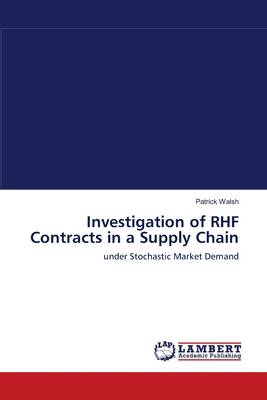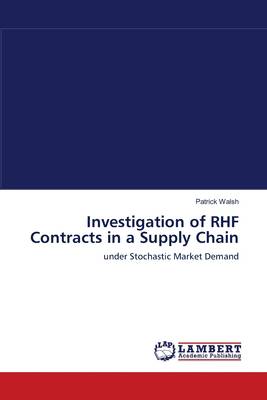
- Afhalen na 1 uur in een winkel met voorraad
- Gratis thuislevering in België vanaf € 30
- Ruim aanbod met 7 miljoen producten
- Afhalen na 1 uur in een winkel met voorraad
- Gratis thuislevering in België vanaf € 30
- Ruim aanbod met 7 miljoen producten
Zoeken
Investigation of RHF Contracts in a Supply Chain
under Stochastic Market Demand
Patrick Walsh
Paperback | Engels
€ 77,95
+ 155 punten
Omschrijving
The research in this book investigates the application of an important class of supply contract called the Rolling Horizon Flexibility (RHF) contract. The RHF contract when agreed is the interface, between the original equipment manufacturer (OEM) and contract manufacturer (CM) in a serial supply chain. Under such a contract, the buyer (OEM) has to commit requirements for components for each period at the beginning of the agreed planned horizon. The supplier (CM) provides some flexibility to adjust the current order and future commitments in a limited way in a rolling horizon manner. The OEM receives demand from the end customer (EC) and the supplier (SU) supplies the CM. This research reports that little formal documentation exists describing how RHF contracts influence supply chain performance, especially under conditions of high coefficient of variation (CV).This research work investigated two types of RHF contracts; RHF contracts with both stationary and decreasing flexibility bounds. The OEM and CM forecasted market demand. The demand was externalised and represented by different distribution shapes.
Specificaties
Betrokkenen
- Auteur(s):
- Uitgeverij:
Inhoud
- Aantal bladzijden:
- 288
- Taal:
- Engels
Eigenschappen
- Productcode (EAN):
- 9783838314761
- Verschijningsdatum:
- 21/05/2010
- Uitvoering:
- Paperback
- Formaat:
- Trade paperback (VS)
- Afmetingen:
- 152 mm x 229 mm
- Gewicht:
- 426 g

Alleen bij Standaard Boekhandel
+ 155 punten op je klantenkaart van Standaard Boekhandel
Beoordelingen
We publiceren alleen reviews die voldoen aan de voorwaarden voor reviews. Bekijk onze voorwaarden voor reviews.











